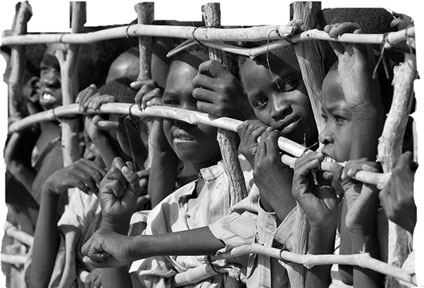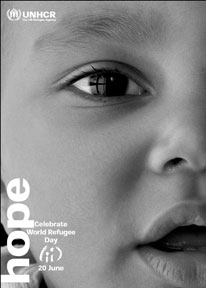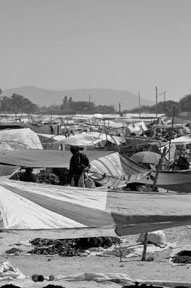|
Today is World Refugee Day:
The long road Home
By Pramod De Silva
 Conflicts between nations and groups are rife in our world and no
part of the world has been spared. All conflicts lead to human
suffering, but the worst aspect is the plight of the innocents caught in
the crossfire. These people often have no choice but to flee to safer
areas, often outside their own country. They thus become refugees -
people who have been uprooted from their own homes due to conflict and
persecution and who flee across international borders seeking safety and
shelter. Conflicts between nations and groups are rife in our world and no
part of the world has been spared. All conflicts lead to human
suffering, but the worst aspect is the plight of the innocents caught in
the crossfire. These people often have no choice but to flee to safer
areas, often outside their own country. They thus become refugees -
people who have been uprooted from their own homes due to conflict and
persecution and who flee across international borders seeking safety and
shelter.
Environmental and climate change disasters also displace people, but
there is no international legal instrument to deal with them at present.
A need for such a mechanism is now being felt.
The UN High Commissioner for Refugees (UNHCR) defines a refugee as "a
person who owing to a well-founded fear of being persecuted for reasons
of race, religion, nationality, membership of a particular social group
or political opinion, is outside the country of his or her nationality
and is unable or, owing to such fear, is unwilling to avail himself or
herself to the protection of that country".
 In addition, the UNHCR's mandate is extended to any person who is
outside his or her country of origin and unable to return there owing to
serious and indiscriminate threats to life, physical integrity or
freedom resulting from generalised violence or events seriously
disturbing public order. In addition, the UNHCR's mandate is extended to any person who is
outside his or her country of origin and unable to return there owing to
serious and indiscriminate threats to life, physical integrity or
freedom resulting from generalised violence or events seriously
disturbing public order.
Right now, the world has 43 million of them. Today, World Refugee Day
(WRD), the world will remember them and contemplate on measures that can
be taken to improve their living conditions and in the long run, to
resettle them. This year's theme for WRD is appropriate in this context
- Home. The UN High Commissioner for Refugees is focusing especially on
displaced children under the slogan 'They took my Home, but they cannot
take my Future'. Children are the most vulnerable segment of refugees
and Internally Displaced Persons.
The purpose of World Refugee Day is to draw attention to the plight
of refugees, celebrate their courage and resilience, and renew
commitment to solving refugee problems. It is also an opportunity to
recognise the contributions that refugees make to the countries that
host them although hardliners in these countries may oppose their very
presence.
Some 43.3 million people were forcibly displaced worldwide at the end
of 2009, the highest number of people uprooted by conflict and
persecution since the mid-1990s, according to UNHCR's annual 2009 Global
Trends report, released last week. Alarmingly, the number of refugees
voluntarily returning to their home countries has fallen to its lowest
level in 20 years.
"Major conflicts such as those in Afghanistan, Somalia and the
Democratic Republic of Congo show no signs of being resolved," says UN
High Commissioner for Refugees Antonio Guterres.
"Conflicts that had appeared to be ending or were on the way to being
resolved, such as in southern Sudan or in Iraq, are stagnating. As a
result last year was not a good year for voluntary repatriation. In
fact, it was the worst in 20 years."
Annual symposium
The High Commissioner, addressing the annual Berlin Symposium for
Refugee Protection on the first day of his second five-year mandate,
added that "already a majority of the world's refugees have been living
as refugees for five years or more. Inevitably, that proportion will
grow - if fewer refugees are able to go home."
The UNHCR report shows that only 251,000 refugees went home in 2009,
the lowest since 1990. This compares to a norm over the past decade of
around a million people repatriating each year.
The number of people uprooted by conflict within their own country
grew by four percent, to 27.1 million at the end of 2009. Persistent
conflict in the Democratic Republic of Congo, Pakistan and Somalia
mainly accounted for the increase in the overall figure. Here in Sri
Lanka, the remaining IDPs are being rapidly resettled in their own homes
and areas. A considerable number of Sri Lankans also live in India as
refugees.
Some refugees opt not to go to their home country and instead apply
for asylum in the country they flee to or in another (third party)
country such as the UK and Australia. The number of new individual
asylum claims worldwide grew to nearly one million, with South Africa
receiving more than 222,000 new claims last year, making it the single
largest asylum destination in the world. However, there are many who
seek to migrate to the West or to other rich countries purely on
economic grounds, but they cite (often non-existent) persecution at home
as a reason. The latter category has given rise to human trafficking on
a large scale.
 The annual 2009 Global Trends report, which reviews statistical
trends and patterns of conflict-related displacements, also covers
Stateless persons. The number of people known to be Stateless at the end
of 2009 was 6.6 million though unofficial estimates range as high as 12
million. The annual 2009 Global Trends report, which reviews statistical
trends and patterns of conflict-related displacements, also covers
Stateless persons. The number of people known to be Stateless at the end
of 2009 was 6.6 million though unofficial estimates range as high as 12
million.
Also with resettlement - through which refugees hosted in one asylum
State, usually in the developing world, are permanently relocated to
another State, usually in the developed world - UNHCR submitted a record
128,000 individuals for resettlement in Third World countries, the
highest level in 16 years.
At the end of 2009, 112,400 refugees were admitted for resettlement
by 19 countries, including the United States of America (79,900), Canada
(12,500), Australia (11,100), Germany (2,100), Sweden (1,900), and
Norway (1,400).
The main refugee groups resettled in 2009 were from Myanmar (24,800),
Iraq (23,000), Bhutan (17,500), Somalia (5,500), Eritrea (2,500), and
the Democratic Republic of Congo (2,500).
UNHCR protection
Out of the total number of displaced persons across the world, only
about half fall under the protection of the UNHCR. In 2009, the UNHCR
was protecting 10.5 million refugees and 15.6 million IDPs - leaving 28
million displaced people worldwide who were not able to avail themselves
of the protection of the UNHCR.
The office of the UNHCR, which will turn 60 in December, protects,
assists and seeks solutions for refugees. The persistence of conflict
makes voluntary return to countries of origin, the solution preferred by
host countries and refugees alike, more difficult.
High Commissioner Guterres has said that the main challenges were the
"growing resilience of crises," the shrinking humanitarian space in
which refugees can find shelter and humanitarian agencies can work, and
the erosion of asylum space.
"Being forced from your home by conflict or persecution is a tragedy
whether you've crossed an international border or not. Today, we are
seeing a relentless series of internal conflicts that are generating
millions of uprooted people," he has said.
There should be greater support from all countries, especially
developed countries to resolve the refugee crisis. The amounts needed to
rescue these people are less than what is needed to rescue banks,
according to the UNHCR. The overwhelming burden of displacement is borne
by developing countries. Eighty percent of refugees are in the
developing world. Generosity and wealth are not proportional to each
other.
The best hope for the world is that conflicts would end, as it
happened in Sri Lanka. In the meantime, the international community must
do more to address the problems faced by refugees and the countries they
belong to, as well as the countries they go to. A concerted effort is
needed to improve their lot and make them feel at 'home' wherever they
are. As the UNHCR slogan says, securing their future is the most
important task in hand.
Facts on refugees
* 43.3 million people forcibly displaced (up from 42 million in 2008)
- this is the highest number since the mid-nineties.
* Figures for refugees remained stable in 2009, at 15.2 million (10.4
million receiving protection or assistance from the UNHCR).
* 27.1 million conflict-generated IDPs (from 26 million in 2008).
* 15.6 of the 27.1 million IDPs are receiving protection or
assistance from the UNHCR.
* UNHCR presented more than 128,000 refugees for resettlement
consideration by States, the highest in 16 years.
* The number of refugees in a protracted situation remained high at
over 5.5 million, spread across 21 countries.
* Developing countries hosted 8.3 million refugees, or 80% of the
total refugee population under the protection of the UNHCR.
* Three countries hosted more than one million refugees in 2009:
Pakistan (1.7 million), Iran (1.07 million) and Syria (1.05 million).
Origin of WRD
For years, many countries and regions have been holding their own
Refugee Days and even Weeks. As an expression of solidarity with Africa,
which hosts the most refugees, and which traditionally has shown them
great generosity, the UN General Assembly adopted Resolution 55/76 on
December 4, 2000.
In this resolution, the General Assembly noted that 2001 marked the
50th anniversary of the 1951 Convention, and that the Organization of
African Unity had agreed to have the International Refugee Day coincide
with Africa Refugee Day on June 20. The Assembly therefore decided that
from 2001, June 20 would be celebrated as World Refugee Day. |

